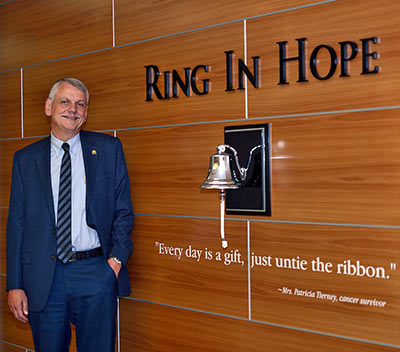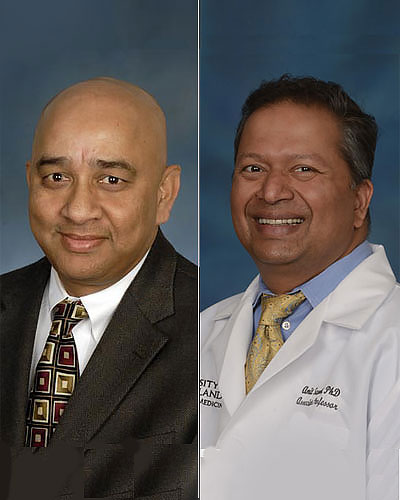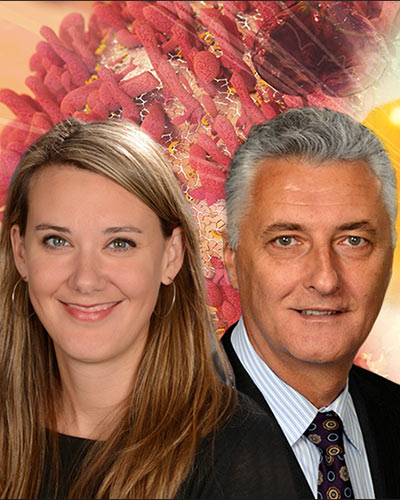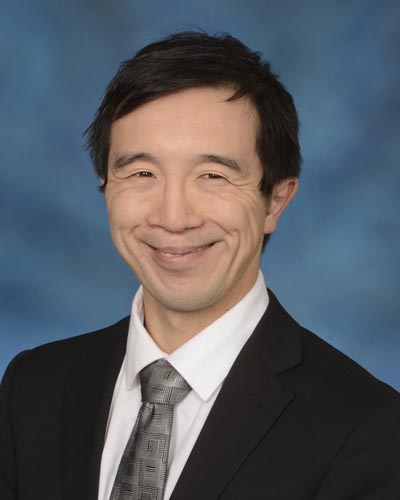July 21, 2017 | David Kohn

Dr. Søren Bentzen Is Recognized for His Innovative Quantitative Research on How Radiation Treatment Affects Cancer and Normal Tissues
Søren M. Bentzen, PhD, DMSc, a professor in the Department of Epidemiology and Public Health (EPH) at the University of Maryland School of Medicine (UM SOM), has been awarded a gold medal from the American Society for Radiation Oncology (ASTRO). This is the highest honor bestowed upon ASTRO members. Itrecognizes a distinguished scientist who has made major contributions to the field of radiation oncology.
Dr. Bentzen, who is also director of the EPH Division of Biostatistics and Bioinformatics at UM SOM, will receive the award at ASTRO’s 59th Annual Meeting in San Diego on September 26, 2017.
“Dr. Bentzen is one of the preeminent researchers in his field,” said Jay S. Magaziner, PhD, MSHyg, professor and chair of the Department of Epidemiology and Public Health (EPH) at UM SOM. “He has maintained an impressively high level of work for a long time, and he thoroughly deserves this honor.”
The award is given to scientists who have made outstanding lifetime contributions to the study of radiation oncology, including achievements in clinical patient care, research, teaching and service to the profession. Over the award’s 41 years, 81 researchers and clinicians have received it.
“Dr. Bentzen's ongoing achievements in the radiation sciences are extraordinary,” said William F. Regine, MD, FACR, FACRO, Isadore and Fannie Schneider Foxman Chair of the Department of Radiation Oncology at UM SOM. "He has focused the multidisciplinary power of cutting-edge analyses to illuminate 'the big picture' in our field. With colleagues from across the globe he has pioneered ways to look at increasingly large databases and, in the process, to provide insights that will power the next generation of beneficial treatments.”
After earning his doctorate in medicine and medical physics from the University of Aarhus in Denmark, Dr. Bentzen was a visiting scientist at the University of Texas MD Anderson Cancer Center from 1987-1988. From there, he held appointments at University of Aarhus, the Gray Laboratory at Mt. Vernon Hospital in London, and the University of Wisconsin before coming to UM SOM. He has published more than 400 articles, and has given more than 300 invited talks at international scientific meetings. In addition, he has received 54 visiting professorships and four clinical trial or research group chairmanships.
Dr. Bentzen also holds a secondary faculty appointment as a professor of radiation oncology at UM SOM and is a member of the University of Maryland Greenebaum Comprehensive Cancer Center.
“I came into this field at a great time,” said Dr. Bentzen. “Radiation therapy has undergone a renaissance. The progress we’ve made in understanding radiation biology and molecular cancer biology has revolutionized the way radiation oncology is practiced.”
 For much of his career, Dr. Bentzen has studied the long-term effects of radiation treatment on normal tissue. This work led him to consider dose-fractionation schedules, and how radiation therapy might be best delivered to maximize tumor control, while minimizing damage to normal tissue. He is now focusing on a new frontier of cancer care: personalized medicine, using big data, to better tailor treatments.
For much of his career, Dr. Bentzen has studied the long-term effects of radiation treatment on normal tissue. This work led him to consider dose-fractionation schedules, and how radiation therapy might be best delivered to maximize tumor control, while minimizing damage to normal tissue. He is now focusing on a new frontier of cancer care: personalized medicine, using big data, to better tailor treatments.
Two other scientists will also receive gold medals this year: Louis B. Harrison, MD, FASTRO; Chair of the Department of Radiation Oncology at Moffitt Cancer Center in Tampa, Florida, and Michael L. Steinberg, MD, FASTRO, Professor and Chair of the Department of Radiation Oncology at the David Geffen School of Medicine at UCLA.
“Dr. Bentzen’s years of hard work has helped to significantly advance the fight against this terrible disease,” said Dean E. Albert Reece, MD, PhD, MBA, who is also the vice president for Medical Affairs, University of Maryland, and the John Z. and Akiko K. Bowers Distinguished Professor and Dean of the School of Medicine. “I know that he will work relentlessly to continue the development of even more precise and powerful ways to reduce the terrible toll of this disease.”
About the University of Maryland School of Medicine
Commemorating its 210th Anniversary, the University of Maryland School of Medicine was chartered in 1807 and is the first public medical school in the United States and continues today as an innovative leader in accelerating innovation and discovery in medicine. The School of Medicine is the founding school of the University of Maryland and is an integral part of the 11-campus University System of Maryland. Located on the University of Maryland’s Baltimore campus, the School of Medicine works closely with the University of Maryland Medical Center and Medical System to provide a research-intensive, academic and clinically based education. With 43 academic departments, centers and institutes and a faculty of more than 3,000 physicians and research scientists plus more than $400 million in extramural funding, the School is regarded as one of the leading biomedical research institutions in the U.S. with top-tier faculty and programs in cancer, brain science, surgery and transplantation, trauma and emergency medicine, vaccine development and human genomics, among other centers of excellence. The School is not only concerned with the health of the citizens of Maryland and the nation, but also has a global presence, with research and treatment facilities in more than 35 countries around the world. medschool.umaryland.edu/
About ASTRO
ASTRO is the premier radiation oncology society in the world, with more than 10,000 members who are physicians, nurses, biologists, physicists, radiation therapists, dosimetrists and other health care professionals who specialize in treating patients with radiation therapies. As the leading organization in radiation oncology, the Society is dedicated to improving patient care through professional education and training, support for clinical practice and health policy standards, advancement of science and research, and advocacy. ASTRO publishes three medical journals, International Journal of Radiation Oncology • Biology • Physics (www.redjournal.org), Practical Radiation Oncology (www.practicalradonc.org) and Advances in Radiation Oncology (www.advancesradonc.org); developed and maintains an extensive patient website, RT Answers (www.rtanswers.org); and created the Radiation Oncology Institute (www.roinstitute.org), a nonprofit foundation to support research and education efforts around the world that enhance and confirm the critical role of radiation therapy in improving cancer treatment. To learn more about ASTRO, visit www.astro.org.
Learn More
• Department of Epidemiology and Public Health
• American Society for Radiation Oncology (ASTRO)
Contact
Office of Public Affairs
655 West Baltimore Street
Bressler Research Building 14-002
Baltimore, Maryland 21201-1559
Contact Media Relations
(410) 706-5260
Related stories

Friday, September 17, 2021
UM School of Medicine Researchers Awarded $3 Million National Cancer Institute Grant for Personalized Imaging to Improve Radiation Treatment
Researchers at the University of Maryland School of Medicine (UMSOM) have received more than $3 million in federal funding from the National Cancer Institute to conduct a study to develop a new precision-based medicine approach to treat lung cancer patients with radiation therapy. The R01 grant was awarded in July 2021 to Rao P. Gullapalli, PhD, MBA, Professor and Associate Vice Chair for Research in the Department of Diagnostic Radiology and Nuclear Medicine, and Amit Sawant, PhD, Professor and recently appointed Vice Chair for Medical Physics in the Department of Radiation Oncology. They will serve as co-principal investigators on the 5-year project, which involves an academic–industrial partnership with Robin Medical, Inc., based in Baltimore, MD.

Wednesday, October 18, 2017
University of Maryland School of Medicine Scientists Set to Begin Critical Radiation Countermeasures Research
University of Maryland School of Medicine (UM SOM) Department of Radiation Oncology Chair and Professor William F. Regine, MD, FACR, FACRO, and UM SOM Dean E. Albert Reece, MD, PhD, MBA, announced today that UM SOM researchers have been awarded a contract worth up to $9.7 million over three years, from the U.S. Biomedical Advanced Research and Development Authority (BARDA), part of the Office of the Assistant Secretary for Preparedness and Response (ASPR) at the U.S. Department of Health and Human Services to study new ways to treat radiation-induced bleeding disorders. BARDA is part of the Office of the Secretary for Preparedness and Response in the U.S. Department of Health and Human Services.

Wednesday, September 20, 2017
New Clinical Trial Explores Combining Immunotherapy and Radiation for Newly Diagnosed Sarcoma Patients
University of Maryland School of Medicine researchers are investigating a new approach to treat high-risk soft-tissue sarcomas by combining two immunotherapy drugs with radiation therapy to stimulate the immune system to destroy the main tumor as well as leftover microscopic cancer cells that may seed other tumors.
